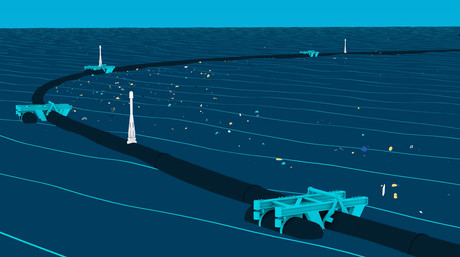Satcoms to help sweep the sea

The Iridium satellite network will deliver critical data, imagery and video for The Ocean Cleanup project.
Iridium Communications has been selected as the preferred provider of satellite communications services for The Ocean Cleanup, the non-profit organisation deploying advanced technologies to rid the world’s oceans of plastic.
The Ocean Cleanup is embarking on one of the largest environmental initiatives of this generation by cleaning up ocean plastic debris, starting with what’s known as the Great Pacific Garbage Patch.
The Ocean Cleanup has chosen Iridium L-band satellite broadband services to support this important mission. The service is being delivered in partnership with Iridium service provider The AST Group.
By creating a system of 600-metre-long floating plastic collectors (floating screens, or systems) that include a 3-metre-deep skirt, The Ocean Cleanup collects plastic pollution through a combination of the wind, waves, natural ocean currents and the floating screen’s ability to prevent plastic escaping underneath it, or flowing over the top, while avoiding ensnaring sea life.
Each system is equipped with two Iridium broadband terminals, and on full deployment of a fleet of 60 floating screens, there will be 120 Iridium broadband terminals operating as part of this project.
The Iridium terminals will relay critical systems data including compartment flood detection, position and location information, pictures, 360-degree video and system performance information.
“The opportunity to play a role in such an important and historic endeavour was a no-brainer for Iridium. It’s an honour for us to be a part of The Ocean Cleanup’s incredible mission to rid the oceans of plastics,” said Iridium CEO Matt Desch.
“A reliable, predictable and redundant communication network that can work despite adverse weather conditions is critically important to this system, and that’s when the Iridium network really shines.
“When the oceans aren’t cooperating and several foot waves and powerful winds are causing havoc, the Iridium system will help make sure The Ocean Cleanup understands the operational status of each floating screen in the fleet.”

The Iridium broadband terminals will receive data from a complex combination of sensors and data gathering equipment hosted by each system. That information will then be relayed to The Ocean Cleanup’s headquarters in Rotterdam in real time.
Iridium’s constellation of 66 interconnected low-earth orbit (LEO) satellites requires no local ground infrastructure and provides the robustness, reliability and redundancy needed to ensure this critical data is delivered as expected.
Iridium is nearing complete deployment of its next-generation satellite constellation, Iridium NEXT. The new constellation is completely replacing the previous network of 66 interconnected satellites. To date, there have been seven successful Iridium NEXT launches completed by SpaceX, deploying 65 new satellites. One launch remains before completion of the company’s historic constellation refresh.
In total, 75 new satellites are being launched to LEO, of which 66 will be in the active constellation, with nine on-orbit spares.
Please follow us and share on Twitter and Facebook. You can also subscribe for FREE to our weekly newsletter and quarterly magazine.
Canberra celebrates 60-year NASA collaboration with new dish
NASA's Deep Space Network facility in Canberra celebrated its 60th anniversary on 19 March...
ACMA releases views on future use of public airwaves
According to ACMA Deputy Chair Adam Suckling, the agency seeks to ensure the greatest benefit to...
New technique to eliminate signals disrupting radio telescopes
An unexpected television signal traced to an aeroplane has led to a new method for pinpointing...





